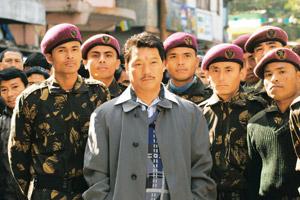Darjeeling, West Bengal: For the past couple of months, 20-year-old Praneel Gurung has been training under retired Army officers to join a force of “peacekeepers” called Gorkhaland Personnel, causing concern to the West Bengal government and ringing alarm bells elsewhere.
A school dropout, Gurung is among thousands of young Gorkhas to whom the Gorkha Janmukti Morcha (Gorkha People’s Liberation Front), or GJM, is imparting “army-style training” at 68 camps across the hills of northern West Bengal.
Led by Bimal Gurung, GJM was founded two years ago as an army of foot soldiers to fight for the creation of a separate state for Nepali-speaking Gorkhas in Darjeeling district and its adjoining areas. “We are fighting for our motherland,” says Praneel Gurung.
Although the demand for a separate Gorkhaland is decades old, it has gained fresh momentum this month, following the Telangana agitation’s success at wringing out an assurance on the break-up of Andhra Pradesh from the Union government. Some GJM members went on a fast-unto-death on 11 December to force the hand of the government, after watching a similar move succeed in the case of Telangana. The GJM on Saturday suspended the indefinite hunger strike after Union home minister P.
Chidambaram said he was concerned about the health of the activists who were fasting. The GJM said it did so to create a conducive atmosphere for tripartite talks to be held on Monday. Ahead of the talks, Union finance minister Pranab Mukherjee on Sunday said the issue could be resolved through dialogue but warned that if the GJM leadership stuck to its demand for a separate state, the situation might turn “critical”. However, the GJM remains firm in its stance that it is not going to discuss anything other than the creation of a separate state.
If that happens, youngsters such as Praneel Gurung will form the backbone of the security force. All of them have been promised “government jobs” in the security forces when the Gorkhas secure a separate state.
The state government is keeping a close tab on the force, West Bengal’s home secretary Ardhendu Sen said in an interview. No action has been taken because the youth haven’t yet done anything “blatantly illegal”, he said. But “we are concerned… The force they are building could easily be used for doing wrong things.”
Others view the camps and their recruits with suspicion. “GJM is garnering mass support by promising government jobs to the unemployed,” says Shikha Mukherjee, a political commentator. “But what they are building is a volatile force… If GJM fails to secure Gorkhaland, this force would surely turn against leaders such as (Bimal) Gurung.”
Starting at five in the morning, they train for about 12 hours every day, learning such varied skills as martial arts, paramedical sciences and traffic management. On the completion of training, they are deployed as “peacekeepers”. Dressed in army fatigues, they act as the police, managing traffic and enforcing GJM’s diktat in the hills—such as a ban on alcohol. “To be part of this force gives me a sense of power,” says Michael Tamang, another 20-year-old who recently finished training.
The camps started a year ago. Until now, around 11,000 people—men up to the age of 30, and women up to the age of 24—have been trained. Another 8,000 are waiting to join the camps, according to Stafford Philip Warner, a retired army officer who now teaches at these camps. Women make up at least 40% of this force. GJM spends about Rs10 lakh a month on training the youth, according to Binoy Tamang, GJM assistant general secretary. “The money comes from the party’s funds and donations,” he says.
The training is so comprehensive that some 50-odd recruits have, according to Warner, landed jobs with the Indian Army. The camps are held for three months at a time, and those joining them receive a stipend of Rs1,000-1,500 a month. “That’s a lot of money for these kids,” says Warner. “They come from extremely poor families.”
For now, the youth form the driving force behind the Gorkhaland movement, leading almost all agitations in the hills. “The youth are one of the pillars of our movement,” says Roshan Giri, GJM general secretary. “In any mass movement, support of the youth is most important. In our case, the youth are being used to bring about social changes.”

